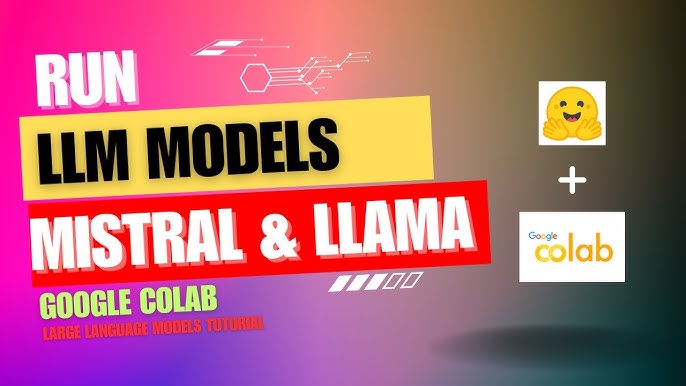
如何在Google Colab中运行大型语言模型并实现对话功能
全面指南:配置、优化与实现高效对话系统

关键要点
- 选择合适的模型与工具库:根据需求和资源选择适当的语言模型及支持库,如Transformers和Gradio。
- 优化运行环境与资源管理:利用GPU加速,配置量化参数,以适应Colab的资源限制。
- 实现与管理对话功能:通过对话接口和上下文管理,实现多轮自然流畅的对话体验。
1. 设置运行环境
1.1 安装必要的Python库
在Google Colab中运行大型语言模型(LLM)需要安装多个关键的Python库,如Transformers、Gradio、Torch等。以下是安装这些库的命令:
!pip install transformers gradio torch accelerate bitsandbytes sentencepiece langchain langchain_ollama1.2 配置Colab运行时和硬件加速
为确保模型能够高效运行,必须配置Colab的运行时环境,启用GPU加速。具体操作步骤如下:
- 点击上方菜单栏的“运行时”选项。
- 选择“更改运行时类型”。
- 在“硬件加速器”下拉菜单中选择“GPU”。
- 点击“保存”以应用设置。
启用GPU加速后,可以通过以下代码验证GPU是否可用:
import torch
print(torch.cuda.is_available()) # 应输出True表示GPU可用2. 选择和准备模型
2.1 选择适合的LLM模型
在选择LLM模型时,需要考虑Colab的资源限制。以下是几种常用且适合在Colab中运行的开源模型:
| 模型名称 | 参数量 | 显存需求 | 特点 |
|---|---|---|---|
| GPT-Neo 1.3B | 13亿 | 中等 | 适用于一般对话任务,社区支持良好。 |
| LLaMA 2 7B | 70亿 | 较高 | 性能优越,适合复杂对话和任务。 |
| DialoGPT | 3.45亿 | 较低 | 轻量级,对话优化良好。 |
根据具体需求和Colab环境的显存限制,选择合适的模型尤为重要。例如,GPT-Neo 1.3B相对较小,适合资源有限的环境,而LLaMA 2 7B则适合需要更高性能的场景。
2.2 下载和加载模型
使用Hugging Face的Transformers库,可以方便地下载和加载选定的语言模型。以下是加载GPT-Neo 1.3B模型的示例代码:
from transformers import AutoTokenizer, AutoModelForCausalLM
model_name = "EleutherAI/gpt-neo-1.3B"
tokenizer = AutoTokenizer.from_pretrained(model_name)
model = AutoModelForCausalLM.from_pretrained(model_name).to("cuda") # 将模型加载到GPU如果选择加载更大或经过量化的模型,可以通过修改参数来优化显存使用:
from transformers import BitsAndBytesConfig
model = AutoModelForCausalLM.from_pretrained(
model_name,
load_in_4bit=True, # 使用4-bit量化
quantization_config=BitsAndBytesConfig()
).to("cuda")量化技术通过减少模型参数的位数,显著降低显存占用,适合在资源受限的环境中运行更大规模的模型。
3. 创建对话接口
3.1 使用Gradio构建用户界面
Gradio是一个轻量级的Web界面库,可以快速创建交互式的对话界面。以下是使用Gradio构建简单对话界面的示例代码:
import gradio as gr
def generate_response(prompt):
inputs = tokenizer(prompt, return_tensors="pt").to("cuda")
outputs = model.generate(**inputs, max_new_tokens=100)
response = tokenizer.decode(outputs[0], skip_special_tokens=True)
return response
iface = gr.Interface(fn=generate_response, inputs="text", outputs="text", title="LLM对话系统", description="输入您的问题,模型将生成回复。")
iface.launch()
运行上述代码后,Gradio会在Colab中生成一个可交互的Web界面,用户可以在其中输入文本并获取模型的回复。
3.2 实现多轮对话功能
为了实现更自然的多轮对话,需要管理对话历史并将其作为上下文输入模型。以下是实现多轮对话的示例代码:
dialog_history = ""
def chat_with_llm(user_input):
global dialog_history
dialog_history += f"User: {user_input}\nLLM: "
inputs = tokenizer(dialog_history, return_tensors="pt").to("cuda")
outputs = model.generate(
**inputs,
max_new_tokens=100,
pad_token_id=tokenizer.eos_token_id,
do_sample=True,
temperature=0.7
)
response = tokenizer.decode(outputs[0], skip_special_tokens=True)
new_response = response[len(dialog_history):]
dialog_history += new_response + "\n"
return new_response
iface = gr.Interface(fn=chat_with_llm, inputs="text", outputs="text", title="多轮LLM对话系统", description="持续的对话会自动管理上下文。")
iface.launch()
在上述代码中,dialog_history变量用于存储对话历史,每次用户输入后,系统会生成新的回复并更新对话历史,从而实现多轮对话。
4. 高级优化与管理
4.1 使用LangChain增强对话能力
LangChain是一个强大的框架,专为构建与管理对话系统而设计。通过集成LangChain,可以进一步提升对话系统的性能和功能。以下是使用LangChain实现对话的示例代码:
from langchain.llms import Ollama
llm = Ollama()
def get_response(prompt):
response = llm(prompt)
return response
iface = gr.Interface(fn=get_response, inputs="text", outputs="text", title="LangChain增强的LLM对话系统", description="利用LangChain框架提升对话能力。")
iface.launch()
通过LangChain,可以更好地管理对话上下文、优化提示设计,并集成更多的功能模块,如记忆、工具调用等,从而构建更加智能和灵活的对话系统。
4.2 管理对话历史与上下文
在多轮对话中,合理管理对话历史是确保对话连贯和相关性的关键。以下是优化对话历史管理的方法:
- 截断对话历史:当对话历史过长时,可以截断前面的内容,仅保留最新的对话部分,以避免超过模型的最大输入长度。
- 上下文摘要:使用模型生成对话历史的摘要,保留关键的上下文信息,减少输入长度。
- 分段管理:将对话分成多个段落,每个段落独立管理上下文,提升模型处理效率。
以下是Implementing context truncation的示例代码:
MAX_HISTORY_LENGTH = 1000 # 根据模型最大输入长度调整
def chat_with_llm(user_input):
global dialog_history
dialog_history += f"User: {user_input}\nLLM: "
# 如果对话历史过长,进行截断
if len(dialog_history) > MAX_HISTORY_LENGTH:
dialog_history = dialog_history[-MAX_HISTORY_LENGTH:]
inputs = tokenizer(dialog_history, return_tensors="pt").to("cuda")
outputs = model.generate(
**inputs,
max_new_tokens=100,
pad_token_id=tokenizer.eos_token_id,
do_sample=True,
temperature=0.7
)
response = tokenizer.decode(outputs[0], skip_special_tokens=True)
new_response = response[len(dialog_history):]
dialog_history += new_response + "\n"
return new_response
5. 注意事项与常见问题
5.1 GPU资源限制与优化
Google Colab提供的免费GPU资源有限,可能无法满足运行超大模型的需求。以下是一些优化建议:
- 选择合适的模型规模:根据GPU的显存大小选择适当的模型,避免因显存不足导致运行失败。
- 使用模型量化:通过量化技术减少模型参数的位数,从而降低显存占用。
- 分布式计算:将模型分布到多个GPU上运行,但这需要更高级的配置和Colab Pro账户。
升级到Colab Pro可以获得更高性能的GPU和更长的运行时间,但需根据实际需求权衡成本与收益。
5.2 内存与显存管理
模型加载和推理过程中,内存和显存的合理管理至关重要。以下是几个实用的技巧:
-
释放不必要的变量:使用
del语句删除不需要的变量,并调用torch.cuda.empty_cache()释放显存。 -
批量处理:尽量批量处理输入数据,减少多次模型调用的开销。
-
选择适当的批量大小:根据GPU的显存大小调整批量大小,避免因内存不足导致的错误。
以下是释放显存的示例代码:
import torch
# 删除变量
del variable_name
# 释放显存
torch.cuda.empty_cache()5.3 模型许可与使用政策
在使用第三方模型时,必须遵守其许可协议和使用政策。特别是从Hugging Face等平台下载的模型,需确保个人或商业用途符合模型的授权条款。
此外,尊重知识产权和数据隐私,避免使用敏感或受限制的数据进行模型训练和推理。
5.4 常见错误与解决方案
在配置和运行LLM时,可能会遇到各种错误。以下是一些常见问题及其解决方案:
| 问题描述 | 可能原因 | 解决方案 |
|---|---|---|
| CUDA Error: Out of Memory | 模型或批量大小过大,超出GPU显存限制。 | 减小模型规模或调整批量大小,使用模型量化。 |
| ImportError: No module named 'transformers' | 未正确安装Transformers库。 | 重新运行!pip install transformers命令安装库。 |
| TimeoutError | Colab连接超时或资源限制。 | 尝试重新连接Colab,或升级到Colab Pro以获得更长运行时间。 |
6. 示例代码汇总
6.1 完整的对话系统示例
以下是一个完整的Google Colab中运行LLM并实现对话功能的示例代码:
import gradio as gr
from transformers import AutoTokenizer, AutoModelForCausalLM
import torch
# 加载模型和tokenizer
model_name = "EleutherAI/gpt-neo-1.3B"
tokenizer = AutoTokenizer.from_pretrained(model_name)
model = AutoModelForCausalLM.from_pretrained(model_name).to("cuda")
dialog_history = ""
def chat_with_llm(user_input):
global dialog_history
dialog_history += f"User: {user_input}\nLLM: "
inputs = tokenizer(dialog_history, return_tensors="pt").to("cuda")
outputs = model.generate(
**inputs,
max_new_tokens=100,
pad_token_id=tokenizer.eos_token_id,
do_sample=True,
temperature=0.7
)
response = tokenizer.decode(outputs[0], skip_special_tokens=True)
new_response = response[len(dialog_history):]
dialog_history += new_response + "\n"
return new_response
iface = gr.Interface(
fn=chat_with_llm,
inputs="text",
outputs="text",
title="LLM对话系统",
description="在Google Colab中运行的大型语言模型对话系统。输入您的问题,模型将生成回复。"
)
iface.launch()
此代码集成了模型加载、对话历史管理和Gradio界面创建,适用于快速搭建一个基本的对话系统。
6.2 使用LangChain的对话示例
通过集成LangChain,可以增强对话系统的功能,以下是使用LangChain的示例代码:
from langchain.llms import Ollama
import gradio as gr
llm = Ollama()
def get_response(prompt):
response = llm(prompt)
return response
iface = gr.Interface(
fn=get_response,
inputs="text",
outputs="text",
title="LangChain增强的LLM对话系统",
description="借助LangChain框架实现的高级对话系统。"
)
iface.launch()
7. 模型与参数比较
为了帮助选择最适合的模型,以下是几种常用LLM的参数与特点对比:
| 模型名称 | 参数量 | 显存需求 | 推理速度 | 适用场景 |
|---|---|---|---|---|
| GPT-Neo 1.3B | 13亿 | 中等 | 较快 | 一般对话与文本生成 |
| LLaMA 2 7B | 70亿 | 较高 | 适中 | 复杂对话、专业领域应用 |
| GPT-J 6B | 60亿 | 较高 | 适中 | 高级文本生成与理解 |
| DialoGPT | 3.45亿 | 较低 | 较快 | 轻量级对话系统 |
选择合适的模型需综合考虑任务需求、资源限制和性能要求。对于资源有限且需要快速响应的应用,GPT-Neo 1.3B或DialoGPT是较好的选择;而对于需要更高理解能力和复杂对话的应用,LLaMA 2 7B或GPT-J 6B更为适合。
结论
在Google Colab中运行大型语言模型并实现对话功能,需经过精心的环境配置、模型选择与优化,以及对话接口的构建。通过合理利用GPU资源、采用模型量化技术和集成先进的框架如LangChain,可以有效克服资源限制,实现高效且智能的对话系统。无论是用于个人项目还是商业应用,遵循本指南的步骤将帮助您在Colab平台上成功部署并运行LLM对话系统,提升用户交互体验和系统性能。
参考资料
Last updated February 11, 2025